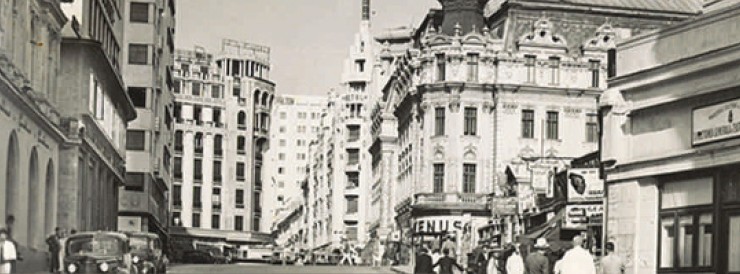
Tangible Fragments of What Was Lost: Restitution of Jewish Property in Post-Holocaust Romania
February 9, 2015
I am sure many of you have been reading about the soon to be released feature film Woman in Gold. Starring Helen Mirren and Ryan Reynolds, the film will be out in early April. It recounts the compelling story of Maria Altmann and her decades-long struggle to have the Gustav Klimt portrait of her aunt, “Portrait of Adele Bloch-Bauer,” seized by the Nazis following the Anschluss, the annexation of Austria, returned to her family by the Austrian State Gallery. Her efforts seemed doomed to failure until the United States District Court for the Central District of California agreed to consider the case, thanks to the extraordinary efforts of attorney E. Randol Schoenberg. Ultimately, the case went to the U.S. Supreme Court, which in 2004 ruled that Austria could indeed be sued for the painting’s recovery. The magnificent painting is now exhibited in the Neue Gallerie in New York City.
I hope that the film will bring attention to the complex history of post-war justice in its many forms, from locating and bringing the perpetrators to trial to recovering stolen assets. Groundbreaking research continues to be done in both these areas. Michael Bazyler, professor at the Fowler School of Law at Chapman University, and Frank Tuerkheimer, professor of law emeritus at the University of Wisconsin, have recently co-authored a book entitled Forgotten Trials of the Holocaust that takes us beyond the more familiar Nuremberg Trials and the trial of Adolf Eichmann. Meanwhile, Dr. Stefan Ionescu, research fellow at the Rodgers Center for Holocaust Education at Chapman University, is pursuing research on the topic of restitution of Jewish property in post-Holocaust Romania.
On Tuesday, February 10, at 7 p.m. in the Bush Conference Center at Chapman University, the Rodgers Center will sponsor a lecture by Dr. Ionescu on “Reversing Robbery: Restitution of Jewish Property in Post-Holocaust Romania, 1944-1950.” Politics, law, and economics shaped the course of restitution of Jewish property in Romania after the war. In the most important and meaningful way, of course, robbery, whether it occurred in Romania, Germany, Austria or other countries occupied by the Nazis, could never be “reversed.” For millions of Jews and others targeted by the Nazis, their way of life and the lives of their loved ones had been stolen from them, never to be regained. Nothing could ever make up for that loss, but the efforts of survivors, their families, and those who fight on their behalf–whether by bringing perpetrators to trial or seeking to recover stolen property, like the Gustav Klimt painting, “Portrait of Adele Bloch-Bauer,”–are seeking justice, however fragmentary and partial, in their names and in their memory.
 Lecture by Dr. Stefan Ionescu on February 10, 7 p.m. in the Bush Conference Center
Lecture by Dr. Stefan Ionescu on February 10, 7 p.m. in the Bush Conference Center
Beckman Hall 404, Chapman University
Admission is free. No tickets/reservations required.
Reserved seating is available for groups of 10 or more.
Contact Ashley Bloomfield at (714) 532-7760 or ambloom@chapman.edu.